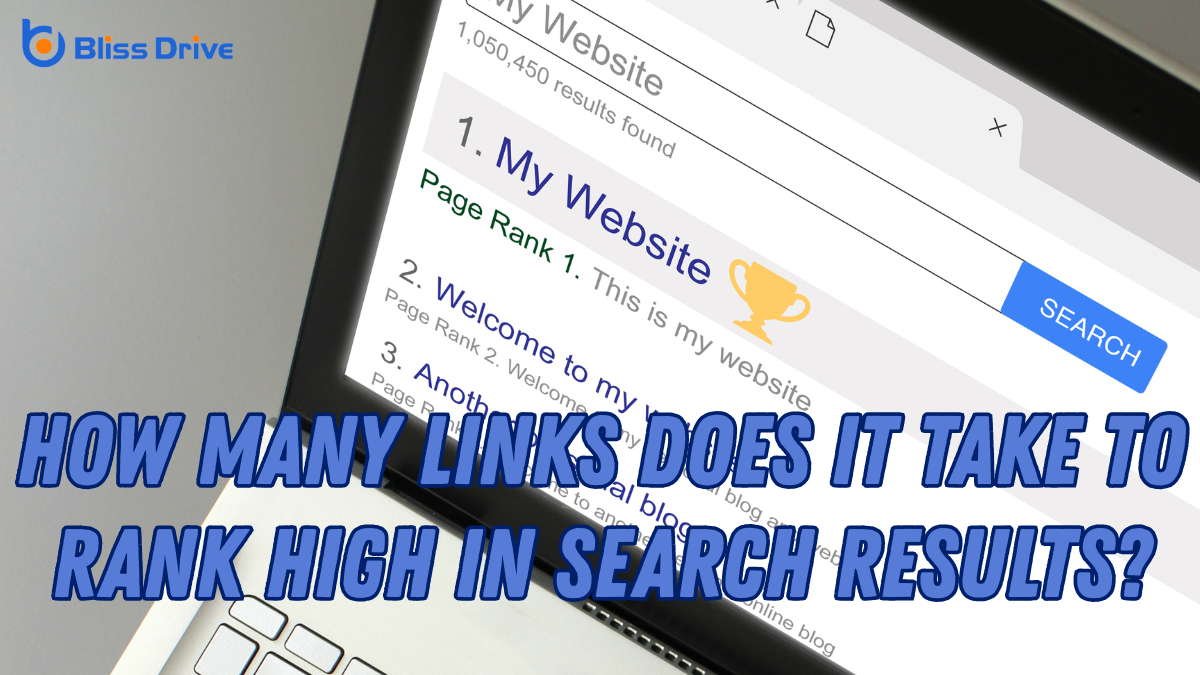Digital Marketing Services
Learn More About Us

When we consider how many backlinksLinks from other websites pointing to your website, crucial for SEO. it takes to rank high in search results, the answer isn't straightforward. It depends on various factors like nicheA specific segment of the market targeted by affiliates to promote products or services. competition and link quality. While it's tempting to focus on sheer numbers, we find that the quality and relevance of backlinks often matter more. So, how do we determine the right balance and build a robust backlink strategy? Let's explore what truly impacts our search rankingsThe position at which a website appears in the SERP..
To truly grasp the significance of backlinks in SEO, we must first recognize how they act as endorsements for our content. When another website links to ours, it's signaling to search engines that our content is valuable and trustworthy. This endorsement helps improve our site's authority and visibility in search results.
Backlinks serve as a vote of confidence, indicating that others find our content relevant and worth sharing. The more quality backlinks we acquire, the more credible our site appears to search engines.
These links are essential for boosting our search engine rankings, as they contribute to our domain's reputation. By understanding this process, we can better strategize our efforts to gain backlinks, ultimately enhancing our site’s performance in the competitive online landscape.

While it might be tempting to focus on amassing a large number of backlinks, it’s crucial to understand that not all links carry the same weight.
In our experience, the quality of links often outweighs sheer quantity. High-quality links come from reputable, authoritative sites relevant to our content. These links signal to search engines that our site is trustworthy and valuable.
Conversely, low-quality links from irrelevant or spammy sites can harm our rankings, potentially leading to penalties.
We should prioritize building relationships with credible sites, focusing on creating valuable content that naturally attracts high-quality links.
This approach guarantees a sustainable SEO strategy. By emphasizing quality over quantity, we enhance our site's authority and improve its chances of ranking high in search results.
As we explore competitive niches, it's vital to prioritize link quality over sheer quantity to stand out.
Let's analyze competitor backlinks to identify successful strategies and spot opportunities for improvement.
Together, we'll develop niche-specific link strategies that can elevate our site's ranking in search results.
In the ever-evolving world of SEO, we've learned that the quality of links often trumps sheer quantity, especially in competitive niches.
It's not about collecting as many links as possible; it's about earning the right ones. High-quality links from authoritative sites can greatly boost our rankings. They send strong signals to search engines, indicating our content's relevance and credibility.
When we focus on quality, we're showing search engines that our content is worth recommending. In competitive niches, this focus can make all the difference.
By targeting niche-specific sites with high authority, we align ourselves with leaders in our industry. This strategy not only improves search visibility but also builds lasting relationships that can leadA potential customer referred by an affiliate who has shown interest in the product or service but h... to future opportunities.
Understanding the importance of quality links leads us to an essential strategy: analyzing competitor backlinks.
By examining our competitors, we can uncover valuable insights that might boost our own search rankings. Let's break down the process:
When it comes to niche-specific link strategies, diving into competitive niches can reveal unique opportunities and challenges.
We've found that in these sectors, the quality of links often outweighs sheer quantity. It's essential to focus on obtaining links from authoritative sites that are relevant to our niche. They bolster our credibility and help us stand out in a crowded field.
Understanding the competition is key. We should analyze their backlink profiles to see which strategies work and where we might find gaps to exploit.
Additionally, engaging with niche communities—whether through forums, blogs, or social media—can lead to valuable, organic link-building opportunities. By staying adaptable and informed, we can develop a strategy that aligns with the specific demands of our niche.
Let's explore how industry standards shape the number of links we need to rank well in search results.
Industry benchmarks provide a reference point, but the competitive landscape often dictates the specific link requirements for our niche.
Industry standards play an essential role in determining how many links are needed to rank high in search results. These benchmarks help us understand the expectations and norms within our specific field. By aligning with these standards, we can better tailor our strategies for success.
Let’s explore how industry benchmarks impact the number of links we might need:
Understanding these nuances helps us navigate the complexities of link-building. By doing so, we can guarantee our content meets industry expectations and stands a better chance of ranking well.
In a competitive landscape, the link requirements for ranking high in search results are heavily influenced by industry standards.
We need to understand that each industry has its unique benchmarks and competitive dynamics, which dictate our strategy.
For example, in the tech industry, where innovation is constant, we may require a robust backlink profile to stand out.
Meanwhile, in a niche market, fewer but highly relevant links might suffice.

Backlink quality often outweighs quantity when it comes to improving search rankings. When we assess backlinks, we’re not just counting numbers; we’re considering the strength and relevance of each link. High-quality backlinks signal credibility and authority.
Let’s break down what makes a backlink valuable:
These factors help search engines determine the trustworthiness and relevance of our content.
We need to focus on acquiring backlinks that meet these criteria to enhance our online presence effectively. Quality over quantity should be our guiding principle in backlink strategy.
Let's consider why link diversity is essential for SEO success.
By securing a varied mix of links from different sources, we not only enhance our site's credibility but also protect it from algorithm changes.
To achieve the best link mix, we'll need to strategically focus on content quality and outreach efforts.
While many focus solely on the quantity of backlinks, we can't overlook the critical role link diversity plays in a successful SEO strategy.
Having a variety of links from different sources not only strengthens our site's credibility but also signals to search engines that our content is trusted across various platforms.
Let's consider why link diversity is important:
When we embrace link diversity, we're not just enhancing our site's SEO; we're building a robust foundation that supports long-term growth.
Diverse links mean we're not overly reliant on one type of source, reducing vulnerability to search engine algorithm changes. By integrating a variety of links—from high-authority sites, niche blogs, and social media—we improve our site's credibility and reach.
This strategy attracts a wider audience, as it taps into multiple channels and communities. It also signals to search engines that our content is relevant across different contexts.
As a result, our site gains more trust and visibility. By diversifying our link profile, we're future-proofing our SEO efforts, ensuring sustained performance and stability in an ever-evolving digital landscape.
To achieve an ideal link mix, we must strategically incorporate various types of links into our site's profile. This diversity not only strengthens our site's authority but also makes it appear more natural to search engines.
A balanced link profile includes:
Understanding the significance of link context and relevance is essential to enhancing search rankings. When we consider the context of a link, we're looking at where and how it's placed within content. A link nestled in relevant, high-quality content holds more weight than one randomly inserted. Relevance guarantees the link aligns with the content's subject matter, reinforcing its authority.
We can't overlook the power of contextual links. These links serve as bridges, guiding users from one valuable resource to another. They’re not just about quantity; their quality and relevance matter immensely.
When links are relevant and contextually placed, they not only help boost rankings but also improve user experience. This combination creates a robust strategy for achieving better positions in search results.

Building on the importance of link context and relevance, let's explore effective strategies for creating high-quality backlinks. First, we should focus on creating content that others naturally want to link to. High-quality, informative, and engaging content is a cornerstone of any successful link-building campaignA set of ad groups sharing a budget, targeting options, and other settings..
To enhance our backlink strategy, we can:
As we endeavor to improve our website's search ranking, monitoring and evaluating our backlink profile becomes essential.
By keeping a close eye on the links directing to our site, we can guarantee their quality and relevance, which directly impacts our search performance.
Tools like Google Search ConsoleA tool by Google that helps monitor and maintain your site's presence in search results. or Ahrefs allow us to track who links to us and assess the authority of those domains.
We need to regularly review this data to identify potentially harmful links or unusual patterns.
Understanding the nature of our backlinks helps us make informed decisions about where to focus our efforts.
When starting link-building campaigns, one of the most frequent missteps is neglecting the quality of the links acquired.
We often focus too much on quantity rather than ensuring the links are relevant and authoritative. To avoid this, we should aim for a balanced approach, prioritizing high-quality links.
Here are some common mistakes in link-building and how to avoid them:
In summary, while it's tempting to focus on the sheer number of backlinks, we must prioritize quality over quantity. By targeting high-quality, relevant links from reputable sources, we're not just boosting our search rankings but also enhancing our credibility. Let's remember that link diversity, contextual relevance, and industry standards all play vital roles. By carefully monitoring and evaluating our backlink profile, we can avoid common pitfalls and effectively strengthen our overall SEO strategy.
